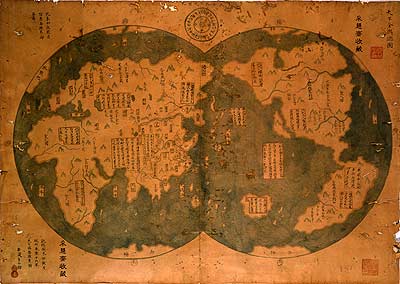
It's plausible, darn plausible. The Chinese exploratory fleet under Zheng He was extremely capable. They certainly could have gone pretty much anywhere navigable on the globe. The lack of follow-up - where are the Chinese colonies in Oregon - is readily explained by the social and political upheavals that wracked China around the time of Zheng He's return to China in 1423.
Absent some compelling archaeological or cartographical evidence (a Chinese settlement, a 15th-century Chinese shipwreck in Newfoundland, or an indisputably 15th century Chinese map), the main thing that proponents of this theory would need to explain away is this: In the age of sail, going into new waters was perilous, because every area has its own treacherous currents and particularly dangerous zones and times. Information about where, when and how to sail is valuable. Sometimes where there are local sailors - fishermen and petty traders - outsiders can assimilate this information relatively quickly. Where there aren't local sailors, you have to do it by trial and error. (When the Portuguese under Prince Henry the Navigator explored the coast of Africa in the 15th century, it took them years for this very reason. They had to go bit by bit, mapping the shoals and currents through careful trial and error.)
The great material resources of Zheng He's fleet (as many as 300 ships and 30,000 men at its peak) would have sped this process up, but the absence of seafarers among the North and South American indigenous populations would mean that every mile of coastal exploration would be painful and dangerous. Advocates of the theory really need to explain how Zheng He did thousands of miles of coastal exploration in the relatively brief "blank spaces" that his known history allow.
However, it's still a darn interesting theory. I'd love to see it proven true, even if that does displace pride of place for my cousin Columbus. (I still get ego gratification from my other cousin Leif, who did it 400-500 years before any of these Sino-Spanish interlopers.)

1 comment:
The question of who got here first is pretty pointless. Nothing done by either the Vikings or the Chinese made Columbus's undertaking any easier. They did not leave behind anything for a later explorer to build on. Unlike Columbus, the earlier explorers did not blaze a path that others could follow. They are not benefactors of posterity. With regard to the discovery of the New World, our benefactor is, and will always be, Columbus. This will remain the case no matter how many one-off voyages were made to the New World by earlier explorers.
Post a Comment